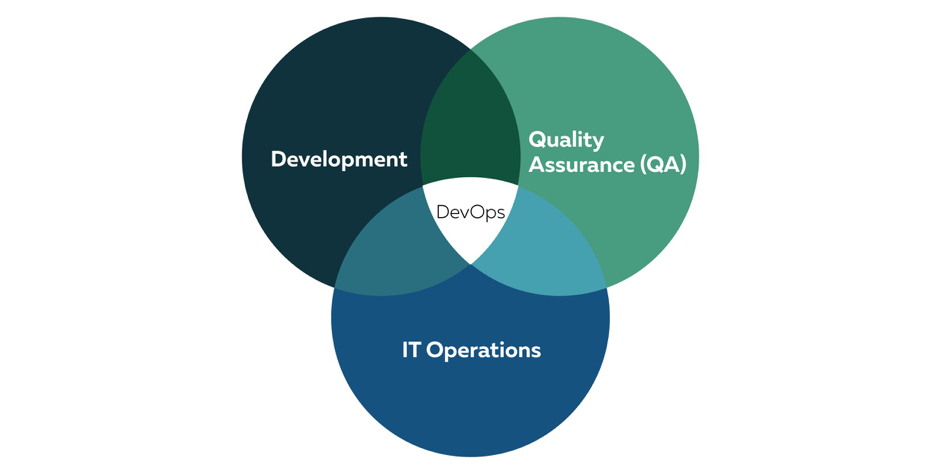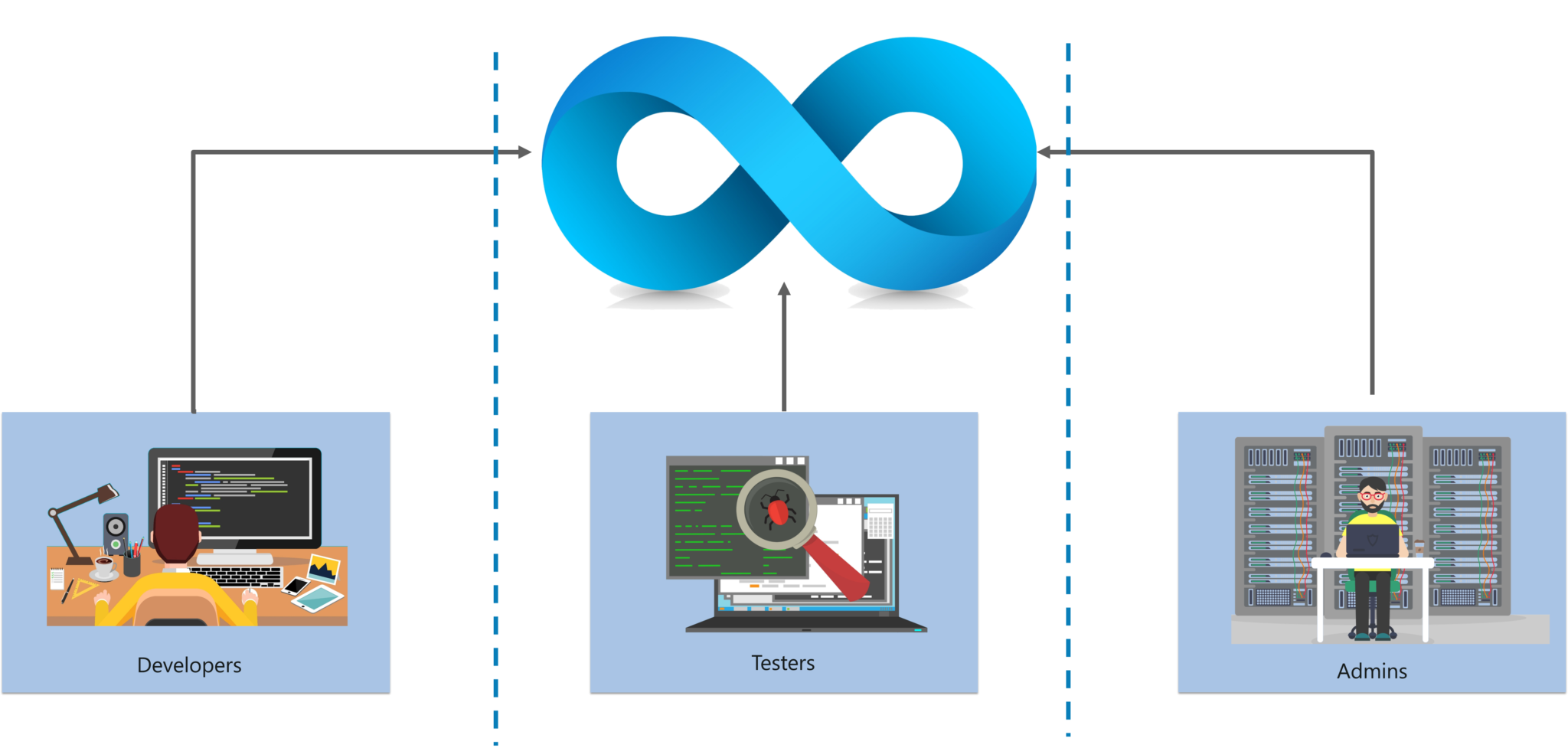Since DevOps inception in 2009, it has revolutionized the IT industry and since then there’s a buzz about DevOps everywhere. In this blog, we’ll clarify the role of DevOps engineer in businesses. DevOps, short for development and operations, acts as a live bridge between development (Dev), quality assurance (QA), and operations (ops) departments. The role of DevOps engineer lies in facilitating departments to rapidly develop and deliver high-quality applications to end-users. The role of DevOps engineers holds an important value in the principle of programming. Role of DevOps engineers, in businesses gaining an edge over the competition, is commendable. This creates a high demand for the role of DevOps Engineer as businesses are growing and every business needs to thrive.

When does the role of DevOps Engineer come into play for your Businesses?
Primarily, the role of DevOps Engineers in businesses reduces communication and collaboration challenges in the IT organization. Role of DevOps Engineers helps companies increase revenue, improve agility, lower down the operational costs, and bolster competitiveness.
From this blog, you can learn to benefit your business from DevOps Engineers. There are 5 major reasons when businesses should embrace the role of DevOps engineer:
1. When your business needs an Improved agility
The agile methodology is the backbone of DevOps technology. Agility in DevOps is all about the rapid delivery of innovation and value to the market. DevOps-engineers in companies deploy code 46x faster, demonstrate 96x better failure recovery rate, and implement changes 440x faster than their competition with no DevOps professionals on board.
2. When your business needs a Higher operational efficiency
DevOps engineers reduce the amount of redundant manual tasks with automation, allowing employees to do more with less. Fullstack DevOps truly increases employee productivity by 51% while reducing the total app development time by 26%. This translates to lower operational costs but higher operational efficiency for the entire organization.
3. When you need to increase the business revenue
According to DevOps.com data, “On average companies that use Fullstack DevOps see a 20% increase in annual revenue.” One of the most important benefits of DevOps technology is its increased velocity which increases your business revenue. Companies gain a competitive advantage by being able to adapt to changing markets and become more efficient in achieving their business revenues.
4. When you want to improve customer experience & satisfaction
With the hiring of DevOps engineers, companies can improve customer experience and satisfaction. According to CA Technologies research, companies that adopt DevOps tools see an average of 45% improvement in customer satisfaction and a whopping 74% increase in customer experience. Better customer experience leads to greater customer loyalty, customer retention, enhanced sales, and greater ROI.
5. When you want to make your business more competitive
DevOps tools make businesses more competitive. This is pretty much self-explanatory – when you rapidly release higher-quality apps to the market, continuously collect and analyze feedback, and consistently act on that feedback to further improve the quality of your product, you can better compete with other companies in your space. It will push you into the area where your business is more competitive and earns more revenue. Fullstack DevOps is an investment that brings long-lasting benefits to businesses globally.

Why does your business need a DevOps engineer?
Now, let’s see why your business needs a DevOps engineer. Though there is ‘n’ number of reasons for this, here are some prominent reasons:
Recommended Reading: 10 Tips to Remember while Hiring DevOps Engineer
1. DevOps Engineers facilitate Faster Development Cycles
Businesses often have a biased response from the development and operations teams, and therefore it is often difficult to tell if the application is operational. When development teams submit a request, the development cycle times are unnecessarily extended. Traditional businesses take from 3 to 6 months to release a product. But with DevOps engineer skills, the same cycle can be reduced into a daily or even hourly release-build cycle. Hence, continuous development and deployment build a significant competitive advantage for businesses.
The advantage with DevOps developers is that with joint development and operations efforts, the team’s applications are ready to use more quickly. The ability to innovate faster than its competitors is one of the foremost reasons for the success of a business.
“Companies that successfully adopt DevOps technology will benefit from agile teams that collaborate more seamlessly and are able to maximize results. These integrated teams can work towards the same goals, and in turn, focus on the right measurements to increase the quality of the digital services.”
2. DevOps Engineers ensures better implementation
Programming defects cause implementation failure in businesses. With shorter development cycles, DevOps roles and responsibilities promote frequent code versions which make it easy to detect code defects. Hence, time can be used to reduce implementation failures using agile programming principles. Recovery time is also an important issue because at times there are some failures. With DevOps tools, this recovery is much faster as development teams and operations work together to share ideas and take into account the challenges of both teams during development.

DevOps engineers run virtualized infrastructures, they can be provisioned, run, and shut down in a matter of seconds, with the costs that are literally close to none, as compared to lengthy manual configuration. DevOps means that you do not have to use a development environment, a different testing environment, and a third implementation. Hence, DevOps engineers ensure better implementation with a collaborative approach.
3. DevOps Engineers make Communication and Collaboration easy
It is well known that a business grows better when teams work collaboratively and there isn’t any scope of miscommunication. The increased communication and collaboration between development and operations teams means that they’re no longer siloed and can communicate with one another freely, sharing knowledge and best practices to build a robust process.
Recommended Reading: Top 10 DevOps Engineers around the World
DevOps professionals are happier and more productive because of effective communication and collaboration. When different teams trust each other, they can experiment and innovate more effectively with more resources. The DevOps culture is of trust between team members and risk-sharing. DevOps eliminates the process of “passing” the application to the processes and waiting to see what is happening. The process becomes transparent as all individuals work towards a common goal.
DevOps is a programming principle that is an excellent execution of collaboration between development and operations teams, it directly translates into shorter development cycles time, increasing the frequency of releasing code into production. DevOps culture is built on the pillars of communication and collaboration, so each member of the team has their say in the process of software delivery. Instead of finding who to blame, the DevOps team achieved new heights together.
4. DevOps Engineers offer Greater Competencies
In today’s competitive environment, the speed of deployment makes it easier to work with and it also gets changes out to the market sooner. It’s necessary to get things into the market as quickly as possible, without neglecting quality or security. This is when the need for DevOps developers for businesses comes into the picture.
There are ways to automate DevOps tasks. The continuous integration servers automate the code testing process and reduce the amount of manual work required. Acceleration tools can be used to compile code faster and accurately. The scalable infrastructure, such as cloud-based platforms, increases the team’s access to hardware resources.
Businesses need to remain competitive in today’s business world. Introducing DevOps technology is one way to achieve this as it allows businesses to increase the heartbeat of deployment and put more rigor into testing. As a result, testing and deployment are accelerated. This way, DevOps engineers offer greater competencies.
5. DevOps Engineers Help Save Time and Money
DevOps engineers save time and money by implementing DevOps tools of IaC, CI, and CD to ensure the uniformity of task scenarios and infrastructure immutability, so automation becomes 100% efficient. This helps greatly in reducing the amount of time and effort spent on routine and repetitive tasks.
Hiring DevOps engineers translate into reduced general costs and requirements of IT staff. In a DevOps environment, automation saves a lot of time and effort. Teams share codebases and take advantage of automatic deploys to expose problems early on in the development process. That just can’t happen in traditional organizations where there aren’t any DevOps professionals. DevOps brings plenty of tangible benefits to businesses. In the State of DevOps Report, Puppet revealed that businesses value from DevOps engineers due to:
- 200x more frequent deploys
- 24x faster recovery times
- 3x lower change failure rates
“DevOps is as much a way of working than anything else, and its introduction can help organizations innovate and speed time to market, and without it, organizations have to function with disparate systems, including both a development environment and a test environment as well as a separate operations department.”
– Patrick Callaghan, enterprise architect, strategic business advisor at DataStax.
Role of DevOps Engineer in various Industries
DevOps tools can be applied in various industries and provide great results for any business, large and small. Below we list full stack DevOps benefits for travel, eCommerce, insurance, finances, and healthcare, to name a few.
- Travel Companies
DevOps tools build efficient technological solutions in no time and optimize their workflows to deliver value to their customers. Adopting DevOps tools quickly provides a competitive edge needed to secure the business in its market segment.
- eCommerce Companies
eCommerce companies operate online and have to remain competitive. They need to store and process huge volumes of data, maintain database integrity and security, provide personalization to their customers, etc. DevOps engineers offer a smooth, automated, cost-efficient, and reliable performance of the system. DevOps is going to be an ace in the eCommerce industry.
- Insurance companies
Insurance companies have to deal with lots of industry-specific challenges, like hard competition due to comparison shopping, new heights of technology utilization set by industry-leading companies. Implementing DevOps technology, its workflows, and CI/CD pipelines can solve all of these issues quickly, and so DevOps engineers are important for Insurance companies as well.
- Healthcare Business
Modern healthcare businesses’ basic IT operations include easy app scalability, high service availability, 100% system security, cross-platform accessibility, and fast feature delivery. All of these can be achieved using DevOps business metrics of software development and IT operations.
- Financial Companies
The reason many financial companies implement DevOps practices to software development and operations is that it helps in the great transition from legacy systems to the private cloud clusters. Due to the ability to weave regulatory requirements into Infrastructure as Code, DevOps engineers are excelling in Financial institutions. When there is little room for human error and close to zero time is wasted on virtual server configuration, code development, and release lifecycle become much more coherent and predictable. And DevOps engineers provide better predictability of the release lifecycle.
In conclusion, implementing DevOps technologies helps businesses grow exponentially by saving time and money, increasing software lifecycle predictability, building a corporate culture around innovation, and keeping the team spirit high. We will highlight it in the details below.
Based on our experience obtained after working for 6 years in the IT industry, businesses from various industries have a variety of problems with IT operations. The new and trending discipline of DevOps addresses them all. Therefore, if you are in need of DevOps engineers, we at EngineerBabu will be extremely achieve your goals. You can hire expert DevOps engineers from EngineerBabu and grow your business.

